Friday
CLIMATE CHANGE - Primary cause is raising animals for meat and dairy
1- MEAT THE TRUTH - A must see documentary on climate change:
What is the main cause for climate change and how to stop it? This extraordinary movie made by the Nicolaas G. Pierson Foundation from Holland shows us the whole and bitter truth about the influence of the meat industry on our climate and on the devastation of our environment, water, air, soil, energy and many other resources.
Take Action - Go Vegetarian, share these videos and visit these sites:
http://www.MeatTheTruth.com
http://www.GlobeTransformer.org
http://www.SeaTheTruth.nl/en/
2- SEA THE TRUTH - How fishing is destroying the oceans and the planet:
Sea the Truth is based on numerous scientific publications that examine the problems of seas and oceans. Below follows an overview of the themes addressed in the film and a brief explanation.
DEEP TROUBLE: WHALE MORTALITY CAUSED BY OVER-FISHING:
According to a report of the New Zealand news channel 3News sea mammals, among which whales, are dying of malnutrition. The makers claim that this is caused by overfishing. Watch the report here: http://www.3news.co.nz/Deep-Trouble-/tabid/371/articleID/169002/Default.aspx
FISHING POLICY AND QUOTA:
Fishing policy around the world is destructive. Recommendations from scientists on quotas are ignored by policy makers, wealthy countries plunder the fishing territories of poor countries and bottom trawlers sow destruction all over the seafloor with their dragnets. In Europe, 88% of fish stocks have been overharvested, such as the blue fin tuna which sadly is threatened with extinction.
EFFECTS OF FISHING ON MARINE ECOSYSTEMS:
In addition to the effect on the fish stocks, fishing also affects all other organisms in the same habitat or ecosystem. Whether the fish being harvested are predatory or prey, the balance of the ecosystem is disrupted and this can have serious consequences. The degree of disruption strongly depends on the fishing method employed.
BYCATCH:
The term bycatch has come to be used to refer to fish caught unintentionally when fishermen fish for commercial fish. These kinds of fish are not interesting to sell and as a consequence they are thrown back into the ocean either death or mutilated. The average bycatch worldwide is about 40.4% of the total amount of fish being caught. This means that 3 kilos of consumed fish brings about 2 kilos of bycatch. In total, 37 billion kilos of fish per year is wasted bycatch.
FISH SUFFERING:
People once thought that fish could not feel anything when they are caught. This idea was probably motivated because fish are cold blooded; this is in contrast with humans who are warm blooded. However, the ability to feel pain does not have anything to do with body temperature. From research studying the behavior of fish, as well as the study of anatomy and physiology, it turns out that fish have feelings and are in fact able to feel pain. This means that the current methods to catch and kill fish are in truth a torture for fish, moreover captured fish die of suffocation: a process that can take up to several minutes or hours.
THE PLASTIC SOUPS:
Between Hawaii and San Francisco floats an enormous amount of rubbish -- a plastic soup with a surface area of 8.6 million square kilometres. To compare: This is 33 times greater than the surface area of the Netherlands (41,528 km2). This plastic soup was 'discovered' by Charles Moore when he sailed through this area with his boat and found himself surrounded day in day out by plastic waste. He later returned with scientific equipment to determine the soup's total size. The plastic soup is a huge threat to a number of marine animals and mammals.
TOXINS IN FISH:
We're told we should eat fish twice a week as it is packed with nutrition. These healthy nutrients are however easily obtained from other food sources, whereas fish may also contain large amounts of toxins. Mercury and dioxins 'enjoy' the status of most researched toxins in fish.
3- Supreme Master TV - The scientific connection between Climate Change and the production of meat:
A video on the avalanche of evidence that identifies one key cause for Climate Change, Water Shortage, Food Scarcity, Deforestation, Ocean Collapse & Biodiversity loss.
LIVESTOCK PRODUCTION:
Supreme Master Ching Hai discusses the interlinked effects of the global livestock industry on global warming, pollution, economics, health and more.
An advocate of the plant-based diet for personal and planetary health for more than two decades, she has in recent years established an international constructive television channel which also highlights the causes and effects of climate change, including through news reportage and interviews with leading scientists and climate authorities. In addition, she has facilitated live-broadcast climate change conferences on several continents featuring government officials, scientists and other representatives advancing the multi-sectoral benefits of dietary change. Widely recognized for her humanitarian works, she is a Gusi Peace Prize laureate and was awarded a U.S. Presidential Award in September this year.
4- SOLUTIONS TO STOP CLIMATE CHANGE:
This short and fabulous video presents several solutions to minimize our responsibility and impact on climate change, especially presenting the most important act we can do everyday to help protect the planet, animals and humankind.
Sunday
11 Powerful Insightful Quotes About Change
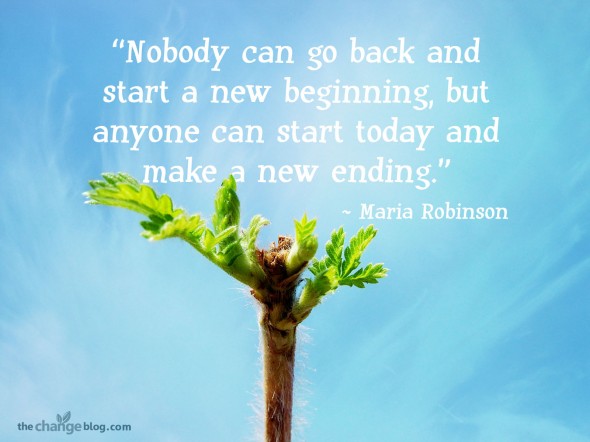
“Nobody can go back and start a new beginning, but anyone can start today and make a new ending.” ~ Maria Robinson
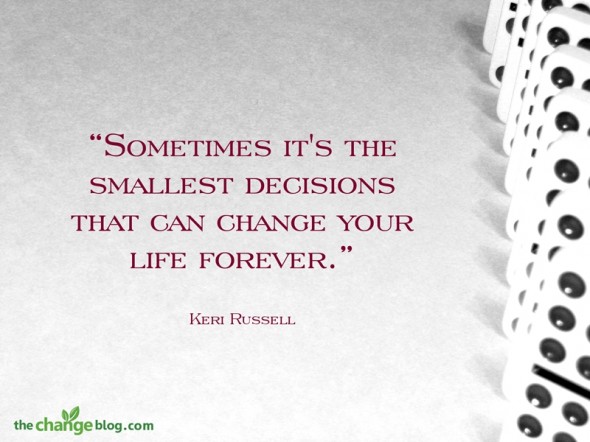
“Sometimes it’s the smallest decisions that can change your life forever.” ~ Keri Russell
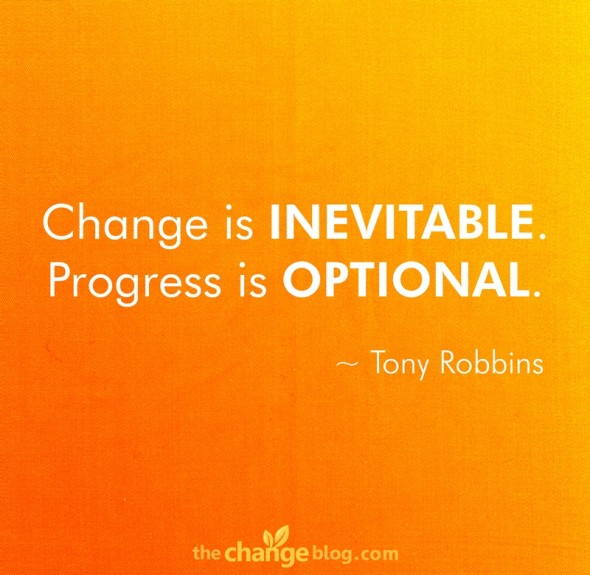
“Change is inevitable. Progress is optional.” ~ Tony Robbins
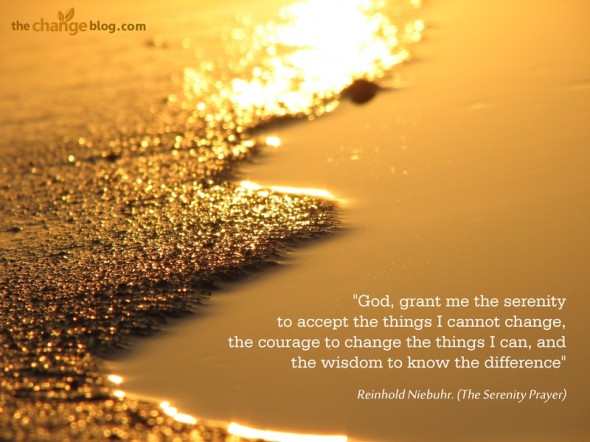
“God, grant me the serenity to accept the things I cannot change, the courage to change the things I can, and the wisdom to know the difference” ~ Reinhold Niebuhr. (The Serenity Prayer)
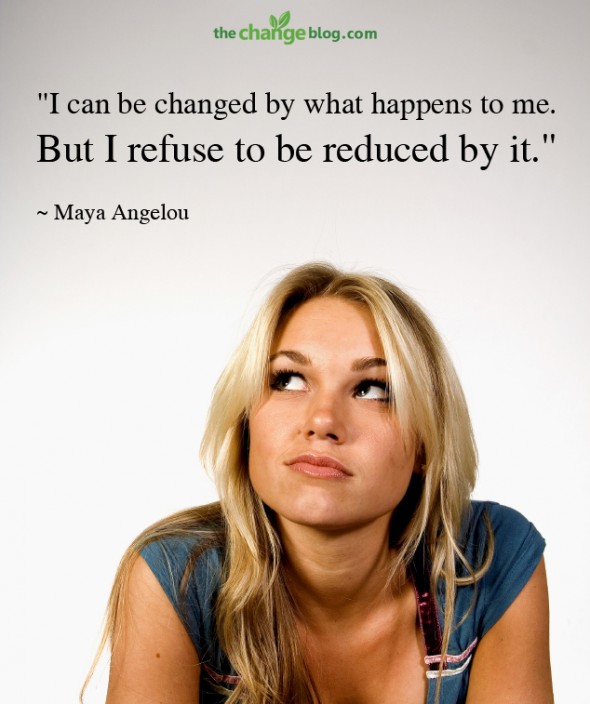
“I can be changed by what happens to me. But I refuse to be reduced by it.” ~ Maya Angelou
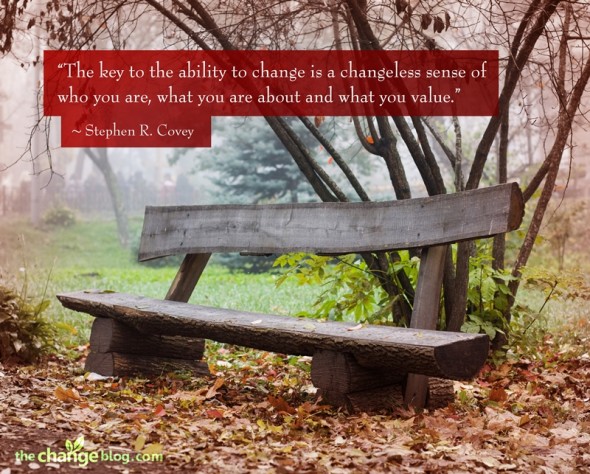
“The key to the ability to change is a changeless sense of who you are, what you are about and what you value.” ~ Stephen R. Covey
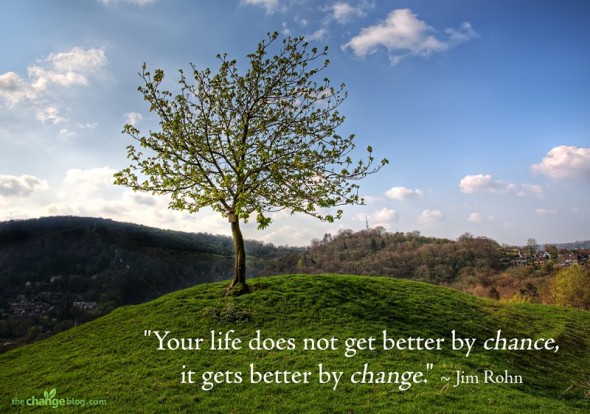
“Your life does not get better by chance, it gets better by change.” ~ Jim Rohn
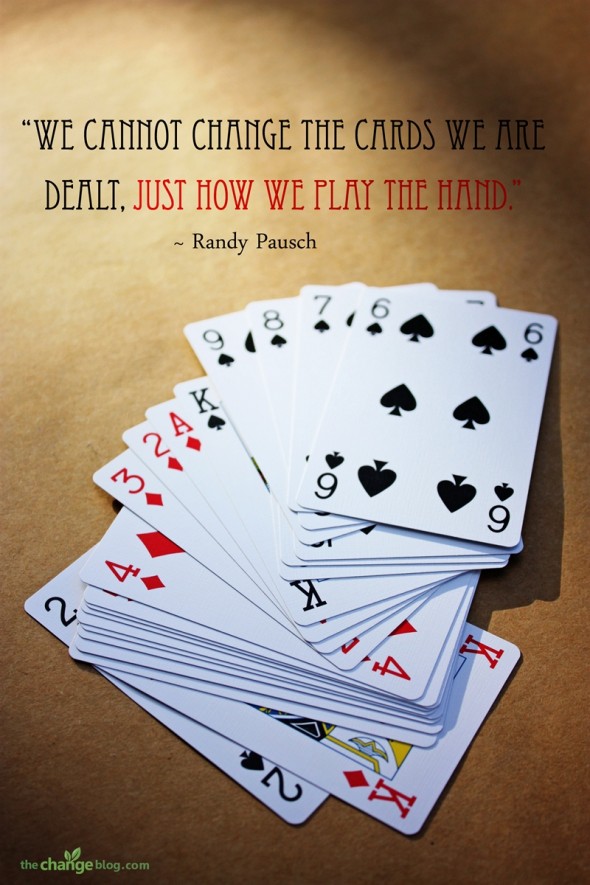
“We cannot change the cards we are dealt, just how we play the hand.” ~ Randy Pausch

“If you don’t like something, change it. If you can’t change it, change your attitude” ~ Maya Angelou
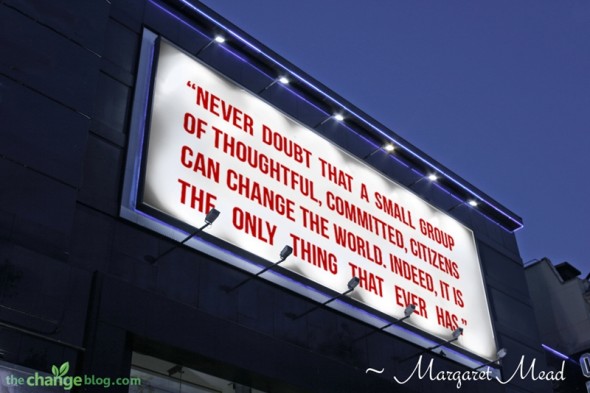
“Never doubt that a small group of thoughtful, committed, citizens can change the world. Indeed, it is the only thing that ever has.” ~ Margaret Mead
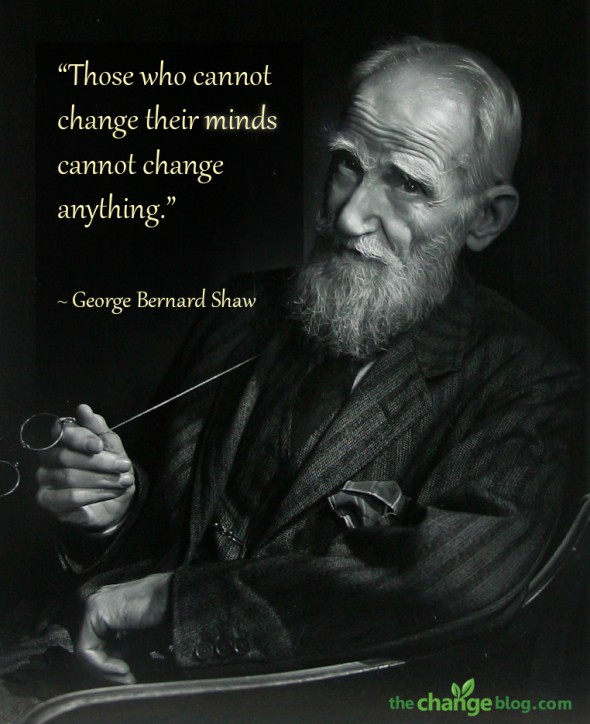
“Those who cannot change their minds cannot change anything.” ~ George Bernard Shaw
* * *
If you have a favorite quotes about change that is not above please share in the comments.
You can find more quotes like these at the blog Life Change Quotes.
Friday
O Homem que Plantava Árvores - Como uma pessoa pode fazer a diferença
Esta animação delicada e única, vencedora do OSCAR de filme curto de animação, é um tributo ao trabalho árduo e à paciência.
Conta a história de um homem bom e simples que, em total sintonia com a natureza, faz crescer uma floresta onde antes era uma região árida e inóspita. As sementes por ele plantadas representam a esperança de que podemos deixar pra trás um mundo mais belo e promissor do que aquele que herdamos.
A Life Connected - A choice that changes the world | A Vida Interligada - Uma escolha que muda o mundo
ENGLISH: Food - Learn how this everyday act that can change and build a better life and a better world.
An excellent and inspiring educational video not to be missed, which presents important information about ethical, environmental, and social sustainability issues within the theme of vegetarianism and consumption of products, which is an urgent matter of vital importance to the survival of the whole planet and the human species.
This video demonstrates how to change a few daily habits can make a big difference in the world, changing many existing paradigms for other more beneficial for everyone.
Be the change you want to see in the world.
PORTUGUÊS: Alimentação - Saiba como este acto diário que pode mudar e construir uma vida e um mundo melhor.
Um excelente vídeo educativo e inspirador a não perder, que apresenta informações importantes sobre questões éticas, ambientais, de sustentabilidade e sociais dentro da temática do vegetarianismo e do consumo de produtos, que representa um assunto urgente e de vital importância para a sobrevivência de todo o planeta e da espécie humana.
Este vídeo demonstra como ao mudar alguns hábitos diários, podemos fazer uma grande diferença no mundo, mudando muitos paradigmas existentes para outros mais benéficos para todos.
Seja a mudança que quer ver no mundo.
Thursday
Carl Sagan: Cosmos - A Personal Voyage
Watch the full 13 episodes:
Introduction:
With Cosmos, Carl Sagan and his wife and co-writer, Ann Druyan, brilliantly illustrated the underlying science of his same-titled book, placing the human species within a space-and-time context that brought the infinite into stunningly clear view. The series, which originally aired in 1980 on PBS, has been seen by more than 700 million people worldwide and remains a high-water mark in miniseries history.
Sagan lucidly explains such topics as Einstein’s theory of relativity, Darwin’s theory of evolution, the greenhouse effect, among other issues, bringing the mysteries of the universe down to a layman’s level of understanding. The footage in these remastered, seven-DVD or seven-VHS sets is as fresh and riveting as it was two decades ago and is certain to fire the imaginations of a whole new generation of viewers. This is one of the most amazing television series.
This documentary inspired many people to a love of science, learning, and freedom of inquiry that have shaped both interests and intellectual curiosities. Of the hundreds of high-quality science doc series released, few approach the majesty and depth of this one. An elegant and artistic enterprise for a well-organized, self-correcting way of reasoning and thinking about the universe and time we occupy. After a quarter of a century, this series is as captivating as it is an education.
Introduction:
With Cosmos, Carl Sagan and his wife and co-writer, Ann Druyan, brilliantly illustrated the underlying science of his same-titled book, placing the human species within a space-and-time context that brought the infinite into stunningly clear view. The series, which originally aired in 1980 on PBS, has been seen by more than 700 million people worldwide and remains a high-water mark in miniseries history.
Sagan lucidly explains such topics as Einstein’s theory of relativity, Darwin’s theory of evolution, the greenhouse effect, among other issues, bringing the mysteries of the universe down to a layman’s level of understanding. The footage in these remastered, seven-DVD or seven-VHS sets is as fresh and riveting as it was two decades ago and is certain to fire the imaginations of a whole new generation of viewers. This is one of the most amazing television series.
This documentary inspired many people to a love of science, learning, and freedom of inquiry that have shaped both interests and intellectual curiosities. Of the hundreds of high-quality science doc series released, few approach the majesty and depth of this one. An elegant and artistic enterprise for a well-organized, self-correcting way of reasoning and thinking about the universe and time we occupy. After a quarter of a century, this series is as captivating as it is an education.
Scientists Declare: Nonhuman Animals Are Conscious
Science leaders have reached a critical consensus: Humans are not the only conscious beings; other animals, specifically mammals and birds, are indeed conscious, too.
It may have seemed obvious to you and me that Fluffy and Fido are aware of their own existence and are not simply biological machines. You may also take it for granted, when you stare into the eyes of a chimpanzee, that you’re seeing a self-aware being. And that when the whale you helped to free from being tangled in fishing gear proceeded to swim around the boat giving you high fives, she was saying thank-you. But scientists (especially those who make money through experimenting on captive animals) have been very cautious in coming to this conclusion.
Finally, however, the official decision was reached in late night discussions two weeks ago during the prestigious annual Francis Crick Memorial Conference. This year’s conference was entitled “Consciousness in Human and Nonhuman Animals” and included presentations by neuroscientists and experts in the fields of marine mammals, birds and cephalopods (octopus etc.). The conference issued this announcement:
Finally, however, the official decision was reached in late night discussions two weeks ago during the prestigious annual Francis Crick Memorial Conference. This year’s conference was entitled “Consciousness in Human and Nonhuman Animals” and included presentations by neuroscientists and experts in the fields of marine mammals, birds and cephalopods (octopus etc.). The conference issued this announcement:
The Cambridge Declaration on Consciousness in Non-Human Animals was publicly proclaimed in Cambridge, UK, on July 7, 2012, at the conclusion of the Conference, at Churchill College, University of Cambridge, by Philip Low, David Edelman and Christof Koch. … The Declaration was signed by the conference participants that very evening, in the presence of Stephen Hawking, in the Balfour Room at the Hotel du Vin in Cambridge, UK. The signing ceremony was memorialized by CBS 60 Minutes.
The group didn’t attempt to define what consciousness actually is. That’s a very complex questions and no one really has a clue. But the full declaration includes statements like:
Birds appear to offer, in their behavior, neurophysiology, and neuroanatomy a striking case of parallel evolution of consciousness. Evidence of near human-like levels of consciousness has been most dramatically observed in African grey parrots. Mammalian and avian emotional networks and cognitive microcircuitries appear to be far more homologous than previously thought. Moreover, certain species of birds have been found to exhibit neural sleep patterns similar to those of mammals, including REM sleep and, as was demonstrated in zebra finches, neurophysiological patterns, previously thought to require a mammalian neocortex. Magpies in particular have been shown to exhibit striking similarities to humans, great apes, dolphins, and elephants in studies of mirror self-recognition.… The absence of a neocortex does not appear to preclude an organism from experiencing affective states. Convergent evidence indicates that non-human animals have the neuroanatomical, neurochemical, and neurophysiological substrates of conscious states along with the capacity to exhibit intentional behaviors. Consequently, the weight of evidence indicates that humans are not unique in possessing the neurological substrates that generate consciousness. Nonhuman animals, including all mammals and birds, and many other creatures, including octopuses, also possess these neurological substrates.
So, is this something more than a bunch of theoreticians telling us what we already know? Yes. It’s a really important statement that will be used as evidence by those who are pushing for scientists to develop a more humane relationship with animals. It’s harder, for example, to justify experiments on nonhumans when you know that they are conscious beings and not just biological machines.
Some of the conclusions reached in this declaration are the product of scientists who, to this day, still conduct experiments on animals in captivity, including dolphins, who are among the most intelligent species on Earth. Their own declaration will now be used as evidence that it’s time to stop using these animals in captivity and start finding new ways of making a living.
Some of the conclusions reached in this declaration are the product of scientists who, to this day, still conduct experiments on animals in captivity, including dolphins, who are among the most intelligent species on Earth. Their own declaration will now be used as evidence that it’s time to stop using these animals in captivity and start finding new ways of making a living.
Read the full declaration by clicking here.
Source:http://www.earthintransition.org/2012/07/scientists-declare-nonhuman-animals-are-conscious/
More articles about this issue:
http://news.discovery.com/animals/animals-consciousness-mammals-birds-octopus-120824.html#mkcpgn=rssnws1
Animal Emotions - Do animals think and feel?
A library of stories that show how amazing animals are, what they are capable of, and that they do feel and think:
http://www.psychologytoday.com/blog/animal-emotions
http://www.psychologytoday.com/blog/animal-emotions
Wednesday
The Crisis of Civilization - Time to Change
The Crisis of Civilization is a documentary feature film investigating how global crises like ecological disaster, financial meltdown, dwindling oil reserves, terrorism and food shortages are converging symptoms of a single, failed global system.
Weaving together archival film footage and animations, film-maker Dean Puckett, animator Lucca Benney and international security analyst Dr. Nafeez Mosaddeq Ahmed – author of A User’s Guide to the Crisis of Civilization: And How to Save It – offer a stunning wake-up call proving that ‘another world’ is not merely possible, but on its way.
Like the book on which it is based, the film consists of seven parts which explore the interconnected dynamic of global crises of Climate Catastrophe; Peak Energy; Peak Food; Economic Instability; International Terrorism; and the Militarization Tendency – with a final section on The Post-Peak World.
The film reveals how a failure to understand the systemic context of these crises, linked to neoliberal ideology, has generated a tendency to deal not with their root structural causes, but only with their symptoms. This has led to the proliferation of war, terror, and state-terror, including encroachment on civil liberties, while accelerating global crises rather than solving them.
The real solution, Nafeez argues, is to recognise the inevitability of civilizational change, and to work toward a fundamental systemic transformation based on more participatory forms of living, politically, economically and culturally.
Monday
Stephen Hawkings - Grand Design: The Meaning of Life
What is the meaning of life?
The nature of reality and the meaning of life are explored in the first episode of a series examining existential matters.
In Stephen Hawking’s Grand Design the planet's most eminent physicist will be addressing three more of the most contentious issues that surround scientific understanding.
Did God create the universe? What is the meaning of life? And what he regards as the key to the cosmos: the Theory of Everything.
Is science incompatible with religion? Lots of famous scientists have certainly not thought so. Professor Hawking examines what evidence there is for a divine hand in the structuring of the universe. Is the presence of some things just too unbelievable to have not had an ‘intelligent designer’?
Why do any of us exist? And what is our place in something so mind-boggling vast as the known universe? Blending philosophy with hard science Professor Hawking tries to answer perhaps the ultimate question that has followed mankind since the dawn of time.
Will the search for the Higgs Boson at CERN, the so-called, ‘God Particle’, provide the key to unlocking the secrets still contained in the midnight dark of the far reaches of the cosmos? Will the ‘Theory of Everything’ be postulated soon? These are the questions occupying scientists all over the world right now. Professor Hawking evaluates the various theories.
Friday
Addicted To Plastic - How plastic is destroying the world
Addicted to Plastic is a documentary focusing on the worldwide production and environmental effects of plastic. The host takes a 2-year trip around the world to give us a better understanding of the life cycle of plastic.
It’s probably fair to say that we all believe buying goods (pencils, food, electronics, etc.) with less packaging is a good thing, and when we separate our trash and drop the plastic rubbish into the blue box for the morning pickup, it all gets recycled, and we can feel confident we’ve done our part for the environment.
A lot of what we use – new trash as well as old – has penetrated some very disturbing levels of the food chain and the ecosystem, and the makes the case that all is not well in our world via a simple boat trip to the North Pacific Central Gyre, aka the Eastern Garbage patch, where air pressure and rotating water currents swirl and push all kinds of floating trash to the water’s surface.
It’s probably fair to say that we all believe buying goods (pencils, food, electronics, etc.) with less packaging is a good thing, and when we separate our trash and drop the plastic rubbish into the blue box for the morning pickup, it all gets recycled, and we can feel confident we’ve done our part for the environment.
A lot of what we use – new trash as well as old – has penetrated some very disturbing levels of the food chain and the ecosystem, and the makes the case that all is not well in our world via a simple boat trip to the North Pacific Central Gyre, aka the Eastern Garbage patch, where air pressure and rotating water currents swirl and push all kinds of floating trash to the water’s surface.
Farm to Fridge - How meat is produced | Da Fazenda para o Frigorífico - Como a carne é produzida
PORTUGUÊS:
Farm to Fridge - A verdade por trás da produção de carne: Mercy For Animals apresenta o documentário "Farm to Fridge" (Da fazenda ao Frigorífico). Narrado pelo ator consagrado James Cromwell e com a trilha sonora do produtor mundialmente conhecido Ben Frost, esse vídeo mostra a exploração por trás das portas fechadas das maiores fazendas industriais, viveiros e abatedouros, revelando o caminho encoberto que os animais fazem da fazenda ao frigorífico.
Subscribe to:
Posts (Atom)







